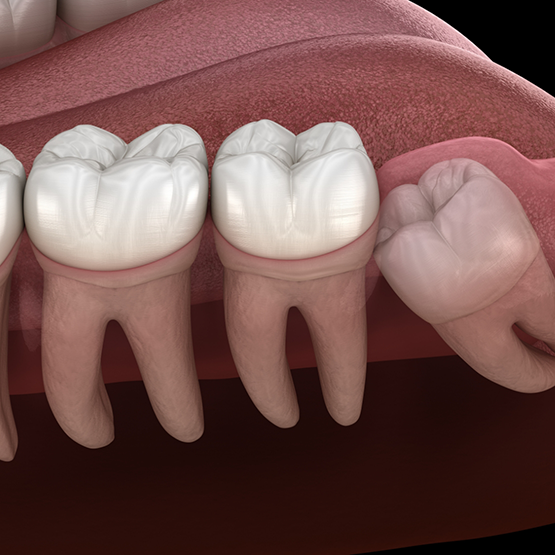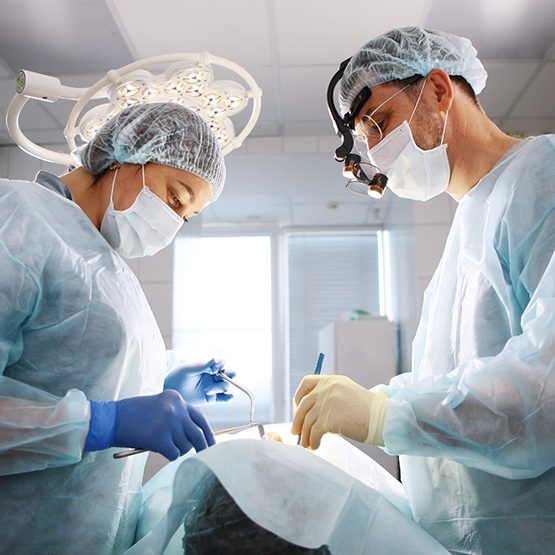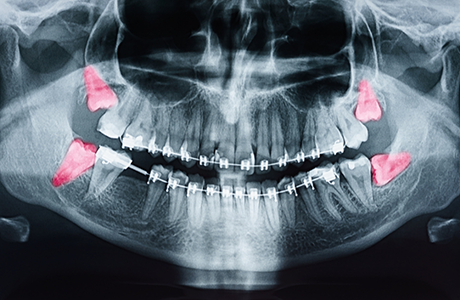Wisdom Tooth Extractions Goodlettsville
When It’s Time to Remove Teeth to Make Space

The wisdom teeth are actually a third set of molars that usually try to come in around the late teens or early twenties. The keyword there is “try,” as most people simply don’t have enough room for them in their gumline. This leads the wisdom teeth to become stuck, or impacted, which can cause pain in the jaw and even crowding in the other teeth. For patients dealing with these kinds of problems, we can take care of them right here with pain-free wisdom tooth extractions in Goodlettsville. Call our dental office today to schedule an appointment.
Why Choose Goodlettsville Smiles for Wisdom Tooth Extractions?
- Dental Sedation Available to Ensure a Comfortable Experience
- Cost-Effective Solution Because Treatment is Performed In-House
- Dentist Uses Enhanced Imaging to Ensure Proper Diagnoses
Why Do We Have Wisdom Teeth?

Our caveman ancestors had a very rough diet, mostly consisting of raw fruits, vegetables, and tough meats. As a result, most would wear down or break their first set of molars by the time they reached adulthood. Many researchers believe that wisdom teeth were intended to serve as replacements. Over time, however, advances in cooking techniques have made the human diet much easier on the teeth. As a result, wisdom teeth are pretty useless for most people in this day and age.
Signs You Need Your Wisdom Teeth Extracted

Wisdom teeth most commonly erupt between the ages of 18 to 25. While not all wisdom teeth must be removed, extraction is a common procedure to reduce dental pain, avoid overcrowding, and prevent bite problems.
If you experience dental pain toward the back of the mouth, that is likely a sign that your wisdom teeth should be removed. Other signs you may need to contact a dentist in Goodlettsville regarding wisdom teeth extraction include:
- Inflammation around the gums
- Development of oral cysts
- Stiffness in the jaw
- Sinus congestion, pressure, or pain
The Wisdom Tooth Extraction Process

Dr. McClain will first numb the area around your wisdom teeth to ensure you do not feel any discomfort during the extraction procedure. She will then make a small incision in the gums to expose the wisdom teeth below. Using forceps, she will gently rock each wisdom tooth back and forth until it detaches. If your wisdom teeth are large, they may need to be divided first into smaller pieces before being removed.
Once your wisdom teeth have been successfully extracted, Dr. McClain will clean the area and stitch up your gums. Then the healing process officially begins!
Aftercare Advice for Wisdom Tooth Extraction

Since anesthesia is often utilized during wisdom tooth extractions in Goodlettsville, you should arrange for a family member or friend to safely drive you home afterward. Plan on resting over the next couple of days to allow your body to begin the healing process.
During the first 24 hours following extraction, avoid drinking through straws or eating hard or chewy foods. Doing so could dislodge or dissolve the blood clot that will form over and protect the extraction site. Stick to eating soft, mushy foods like yogurt, mashed potatoes, soups, or smoothies.
While you should continue your normal oral hygiene routine, do not brush or floss too close to the extraction site during the first couple of days.
Finally, be sure to take any pain medication prescribed by Dr. McClain and rinse with warm salt water as directed.
Understanding the Cost of Wisdom Tooth Extractions

The cost of wisdom tooth extractions in Goodlettsville can vary depending on numerous factors, but rest assured, our team is committed to working closely with you so that you’re given a detailed estimate before you commit to treatment. We’ll also be sure you know how your dental insurance and other financial options can be used to minimize your costs at every corner. If you have any questions about your procedure or any of its financial implications, feel free to contact us for more information or assistance!
Factors That Can Impact the Cost of Wisdom Tooth Extractions

Here are some of the most notable factors that tend to affect the cost of wisdom tooth extractions:
- Impacted Teeth – Wisdom teeth often need to be removed because they become impacted while erupting due to insufficient space in the mouth. Teeth can be impacted vertically or horizontally, and this can lead to the surgery being more time-consuming and costly. While we can extract non-impacted teeth in our office, we will usually refer to a specialist for impacted teeth or if the patient desires sedation.
- Number of Teeth – Believe it or not, some people are born with fewer than four wisdom teeth, which factors into the cost. It’s even possible that they all might not even need to be removed.
- Need for Sedation – Dental sedation may be necessary, depending on the extent of the treatment and the patient’s needs. Impacted teeth tend to require some form of sedation.
Does Dental Insurance Cover Wisdom Tooth Extractions?

In many cases, wisdom tooth extractions are at least partially covered by dental insurance, given that the procedure has numerous medical benefits and is useful for preventing long-term oral health issues. Just be sure you’re familiar with the details of your policy before committing to treatment. We’re happy to work in-network with numerous providers, and we also welcome out-of-network plans and are happy to help you file claims if necessary. If you have any questions about your coverage, please feel free to ask us for assistance!
Other Options for Making Wisdom Tooth Extractions Affordable

In addition to welcoming dental insurance plans, we’re also thrilled to work with third-party financiers like Cherry. Qualifying patients can break up the cost of their dental care into manageable, low-interest monthly installments with no hidden or surprise fees. This means that you’re able to easily afford your wisdom tooth extractions and other dental healthcare needs without worrying about your finances.
Wisdom Tooth Extractions FAQs
How Do You Sleep After Wisdom Teeth Removal?
Although you won’t feel any discomfort during the wisdom tooth extraction process, some soreness afterward is to be expected. As you can imagine, this poses a problem when it comes time for bed. The good news is that there are several ways you can ease your discomfort, allowing you to sleep soundly. The first is taking your prescribed or over-the-counter pain medication as directed. The second is using a cold compress for 10 minutes at a time to ease inflammation and numb the area. The third is propping yourself up on a few pillows to keep your head elevated throughout the night.
Does Everyone Have Wisdom Teeth?
You might be surprised to hear that not everyone has wisdom teeth. In fact, the Dental Research Journal stated in 2015 that anywhere from 5% to 37% of people are missing one or more! Since genetics are considered to be a factor, there’s a chance that you won’t have all four wisdom teeth if your parents didn’t.
Should Wisdom Teeth Be Removed If They Don’t Hurt?
It’s very common for patients to experience pain when their third set of molars erupts. However, that’s not always the case! Sometimes, they make an appearance without any discomfort at all. The deciding factor in whether or not they need to be removed will be how their presence impacts your oral health. If you’re at risk for an infection, cysts, or orthodontic issues, then we will recommend having them extracted before that happens.
How Soon Can I Eat After Wisdom Teeth Removal?
Usually, patients are encouraged to wait an hour or two. There are a few reasons for this, including the fact that your mouth will be numb, and it’s important to keep the gauze pads in place to slow down bleeding. When it does come time to eat, make sure to stick to soft foods, like vegetable soup, and always check the temperature first.
Note: In some cases, patients are asked to stick to a liquid diet for a day or two. If you’re ever unsure of what you should and shouldn’t do during the recovery process, read through the aftercare instructions or give us a call.
What’s the Best Age to Get Wisdom Teeth Removed?
That depends! In some cases, children in their early teens have them removed before they fully erupt. Other times, adults in their 50s or 60s have them extracted because they are causing significant discomfort. The best time for you to have yours removed depends largely on when they emerge, if they grow in straight, and if you’re in pain.

